A brief and wildly incomplete list of moments in stories (and songs) that call up a mood I would like to experience repeatedly and on demand:
- The lighting of the beacons in The Return of the King
- “Kiss me, Hardy!” (Code Name Verity)
- Starbuck and Apollo punch it out (Battlestar Galactica)
- Neko Case singing, “I’m holdin’ out for that teenage feeling”
- Kelly Link’s “Prince Hat Underground”
- Samantha Crain’s “Songs in the Night”
- “Peaches and plums, motherfucker.” (The Magicians)
- Gabrielle Zevin’s Tomorrow and Tomorrow and Tomorrow
A different person might call what I’m seeking “vibes,” but for me vibes and moods are different. Vibes are atmospheric sensations, a setting, a type that you always enjoy, a plot element used cleverly. Moods are feelings, are what I want these elements and more to evoke in me: something bittersweet, something hopeful but in need of help; something that is full of love but complicated by circumstance; something self-aware, lonesome, yearning.
But how does a person go in search of the precisely right book that will incite a feeling?
This is part of a bigger question, one too large for any single column: How do you find the books that you should be reading? (By should, I mean the ones that feel made for you, not “should” in any sort of prescriptive, good-for-you way.) How do you know? How can you slice through the layers of language and description that is designed for a purpose—to market the book—and figure out whether the book itself will speak to you?
I am sorry to say this is not a question for which I have an answer—just one I want to discuss.
We’re in the midst of an interesting moment in how books are marketed and described. Tropes (as fandom folks know the word) are everywhere; you can hardly scroll through bookish Twitter without encountering an image over which a series of words and phrases have been layered, often including things like “just one bed,” “enemies to lovers,” and the like. For some readers, this is gold; this is how they find what they want, how they can swiftly and easily identify the things that make books tick for them. But it’s tricky: your “dark academia” might be my “They’re at a school, but where’s the darkness?”
I want to know more about who I’m about to spend long hours with. Sure, I want types sometimes: a smart-mouthed badass (Gideon, Starbuck, Buffy) or a hapless sensitive knucklehead forced to grow up (Quentin Coldwater) or a complex parent (Essun) or noble young heart struggling to do the right thing (Bitterblue, Tess) or a character who comes out of left field and makes me love them despite all the reasons they are not my usual character type (Amos Burton, Tomorrow and Tomorrow and Tomorrow’s Marx). But even if I saw these things used as phrases, I wouldn’t know for sure that the books are for me. How do the characters fit into their worlds? What kind of stories are we talking about? Am I going to feel the things I want to feel?
How can you ever fit that into a pithy little phrase? Into a blurb? Into cover copy that speaks to every possible reader of a book?
It’s impossible. Everyone seems to have a story about a book that sounded perfect for them, but once they got past the cover it was all wrong. There are books I love dearly that I read despite, not because of, the cover or the cover copy. But all the details of a book, from the title to the text on the back to the font used for the title, all those things were chosen for a reason. We just can’t know if that reason aligns with our reasons.
We can, of course, talk to friends, or dig into Goodreads or Storygraph or other online reviews, though then you add layers to the issue: you also can’t know if the person whose review you are intrigued by has the same tastes and bookish desires that you do. (I like to read one-star Goodreads reviews of books I absolutely adore; I like seeing what other people hate in them. Ditto five-star reviews of books I hated. Tell me more! Tell me what I didn’t see!)
Buy the Book
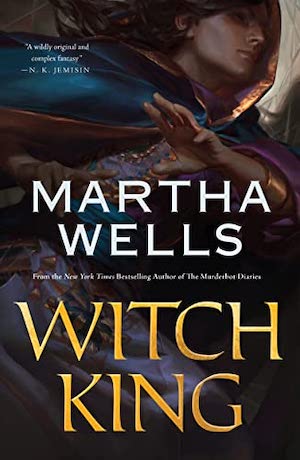

Witch King
What I am saying here is, in essence, that being a reader is not just a matter of picking up a book, thinking Oh, that looks interesting, and taking it home and reading it. If you are reading this column, you probably know this. But what does it mean—what does it entail—to find the things you’re most likely to love? Do you read blurbs? Do you read reviews? Do you trust the internet or the star rating on one site or another?
Given infinite time (and infinite books), I think I would like to create a sort of endless Venn diagram of book moods. You start with one bubble. Let’s say you put into it The Fifth Season. What do you love best about that book? The structure? The different voices? The way it feels hopeful and apocalyptic at once? The way Jemisin threads so many different moods and feelings, rage and love and fear and everything else? What do you want it to overlap with? Could one bit of the diagram overlap with the complex parental feelings of I Keep My Exoskeletons to Myself? Could the fragile community aspect share common ground with Megan Giddings’ The Women Could Fly? Is there anything else that has the kind of geological science fantasy vibes this series gets into? (This is a serious question.)
Are there connections that aren’t just plot, aren’t just types, but moods? In which books does the world end but you feel kind of okay about it? (Appleseed is one of those for me.)
The understated but devastating heartbreak of Code Name Verity has an overlapping point with Never Let Me Go. The elaborate swirl of post-catastrophe small-town life in Wendig’s Wayward shares space with some episodes of the series adaptation of The Last of Us.
But these are all books I’ve read. It takes a certain kind of magic to figure out these moods for things I’ve not read yet. It’s why making an on-deck stack of things I want to read next so rarely works. The mood is wrong. The vibes are off—not forever, but for now. It’s why sometimes a book buried on the shelf seems to whisper a certain kind of song. If only I could slip on a literary mood ring, a cheap color-changing stone from a vending machine, the kind you purchase for a couple of quarters. Maybe it matches up with book colors. Maybe it just knows.
How do you choose a book for a mood?
Molly Templeton lives and writes in Oregon, and spends as much time as possible in the woods. Sometimes she talks about books on Twitter.










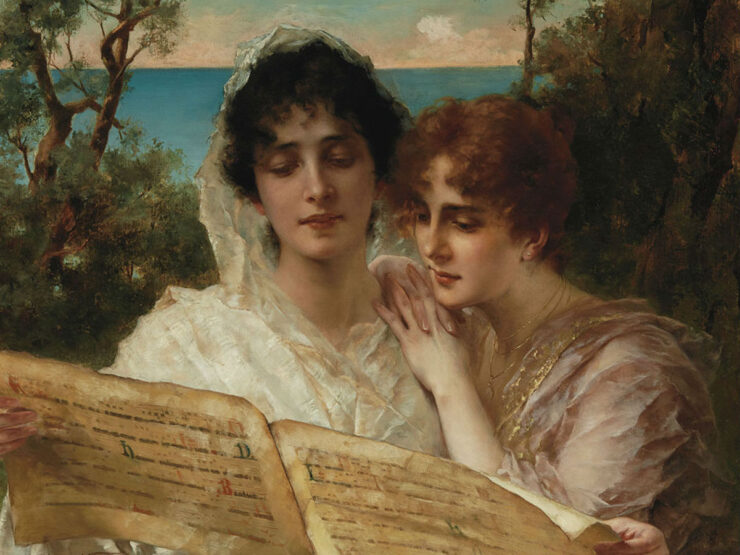

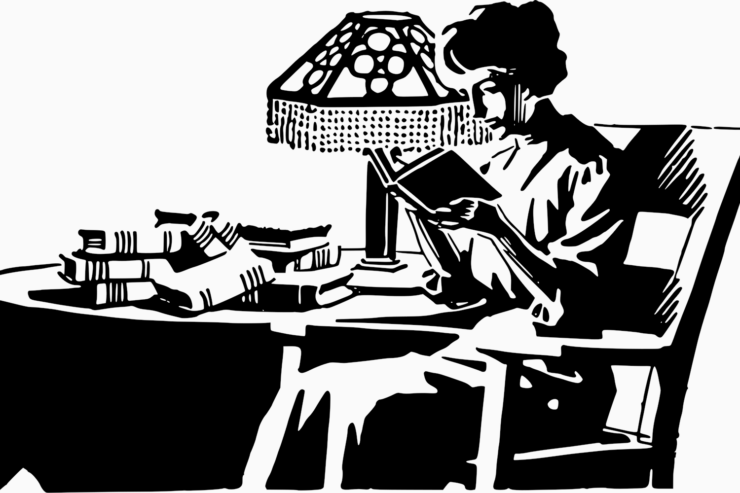
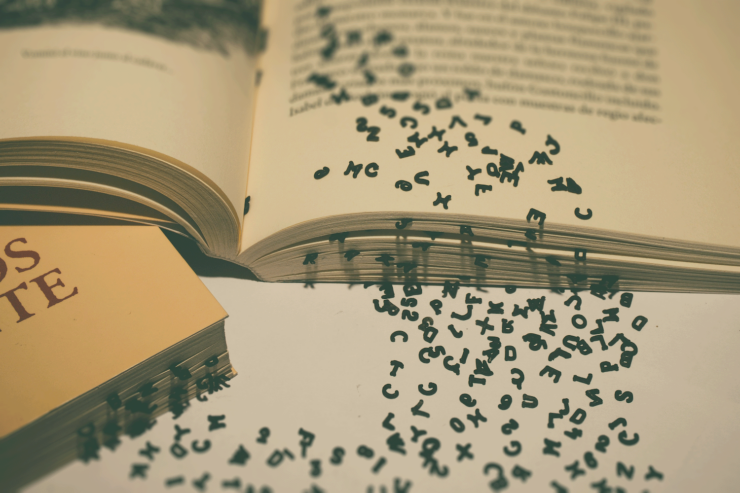
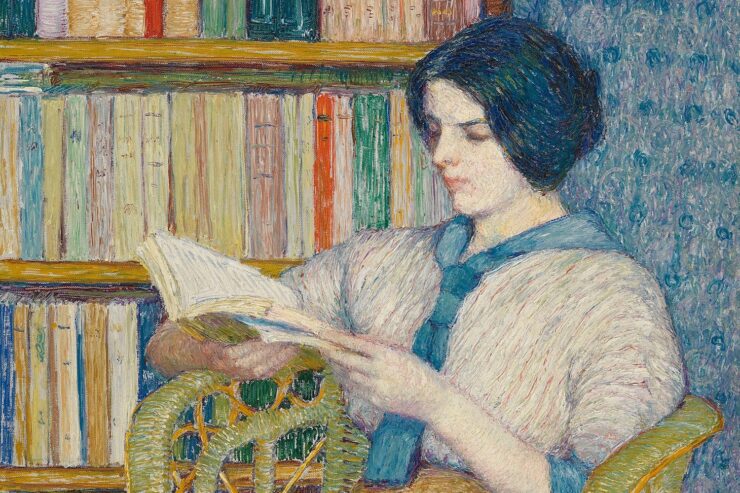
Cool!
A mood ring like a compass that would lead us to the right book would be helpful :).
Depending on the mood I’m in I’ll scan the shelves (or find something on gutenberg). I do have some go-to books: feeling a certain kind of oppression, it’s The Blue Castle or The Divine Secrets of the Ya-Ya Sisterhood, and feeling cultural/current events pressure/stress it’s certain letters in The Letters of J.R.R. Tolkien or OP or DH or Vol. 3 of Hannah Arendt’s The Origins of Totalitarianism.
I love this article! Definitely know the feeling and wish I had this mood ring…
Agree that this is why I can’t really plan ahead on my reading(no on deck stack!). Last night, was needing a new book (had just finished Enchanted April) and wanted something similarly relaxing and encouraging – something that would fit a mood of peace and home. Scanned my “to read” piles and could not find a single one to match, alas! In response to comment @1 – Blue Castle would have been a great read too and I thought of that one but that one is lent out at moment.
Funnily enough, ended up grabbing a Stableford novel I’ve not read and even though it wasn’t the mood I felt, I quickly sunk into it.
But yes, my mood changes so what I’m looking for today very likely won’t be what I’m looking for tomorrow. I have found that I need to increase my “cozy” books though, as those are the ones that I seemingly can never find when I feel in that mood. I have plenty of thick literary tomes, angsty poetry, gritty modern and trashy sci-fi / fantasy. I need more books that are cozy and comforting yet real and that have beautiful prose!!
I do like GoodReads, seeing what my friends are reading and seeing what catches my eye. Found so many good books that way – and I also like reading 5-star ratings of books I dislike and 1-star ratings of books I love! So fascinating, helps me understand both others and myself better. What also helps is that I’ve discovered which of my GR friends have similar tastes and moods to myself, so if they really like a book, I know that I typically will as well…and I have the opposite too!
Have a friend who I greatly admire for her intellectual acuity and sparkling wit, yet we have found ourselves on the opposite many times in terms of which books we like or don’t like! She adores All the Light We Cannot See whereas I found it cloying and pretentious. I much enjoyed Elif Batuman’s The Idiot, but she thought it was absurd and without redeeming quality. Admittedly, I do love the absurd. But now if I see she dislikes a book, I figure…I should probably pick that one up!
And I have gone far afield here. Anyway. Wish it was easier to find books that match certain moods – I think having a stockpile of favorite authors helps. I know I can always count on Montgomery/Alcott/Berry/L’Engle for a certain mood. Discovering new authors that are similar – that’s the trick!!
@2 I have the same problem of not having enough cozy books to grab when I need one. I just finished Dark Matter recently and the only book I had available for a comfort read was a book of essays. Not what I truly wanted but it did get me to stop thinking of the multiverse. The book mood ring would be so handy. Oh well!
It only helps if you’re mostly looking for old (mostly public-domain) fiction within a certain range, but the reviews at https://redeemingqualities.wordpress.com/ are absolute *gold* for me – I do not have the same preferences/inclinations, but the way books are described gives me something close to a 95% chance of knowing whether it is my sort of book or not (and whether it’s the sort of book I’m looking for or not, which is more of the mood question).
I have long wanted to build a “if you liked X, try Y!” online web (do you remember those off-brand perfumes?), with threads to click for liking the writing style, specific character representation, location, specific themes, optimism levels, etc., but it is giant and hairy and yes, again, would only contain the books I’ve read, not the ones I want to discover…
Right now my resources are slim in terms of being able to deal with unpleasant worlds, so I’m looking for more Melendy books, or Vanderbeeker books, or Penderwick books, personally…
I almost always want to read something distinct from the five or six books I’ve most recently finished, so that generally steers me in the right direction; I cycle through favourite genres/topics/authors and most of the time automatically put long gaps between two very similar books. Sometimes I can tell when I pick up a book that I’m just not in the sort of mood that suits it. Both of these selection processes are more process-of-elimination than anything else, though!
Same here. I still go to my brick and mortar indie bookstore. It is like a vacation day so I make the time to go. I need the ambience,the smell, the quiet and chatting with others to get input. The employees obviously love to read so they all have different perspectives on recommendations, and they show such enthusiasm it’s contagious.I know, old school but to me it is the best more enjoyable way to buy books.
I resent the automated ‘if you liked this’ because there are many reasons I liked a book. Almost as important as story it’s the writing style I look for. Just because I read a mystery doesn’t mean I like mysteries. There is a myriad of reasons I like a book. I don’t know if this helps anyone but the real bookstore is where I find my joy and all of my favorite books.
If your local library subscribes to a database called Novelist, you can do things like search for books that have certain moods like “Sardonic and witty” or “Reflective and thought-provoking” and other themes and tones. You can also enter a title or author you like and find similar titles. Developed and maintained by librarians.
I use https://thestorygraph.com/ for recommendations, which doesn’t have quite the 1-1 you’re looking for but has the closest set of search metadata I’ve found. Fantastic recommendations with moody flavor. And it’ll improve if more folks are using it, it’s not tied to Amazon at all (indie), and it’s POC woman owned.
I can never figure out what book is right for me, either, which is why most of my favorites came as genuine surprises. It’s even more heartbreaking when I read a book and just know it would have been perfect for me, had I read it earlier—Radio Silence would have been a dear best friend if I knew of it while I was in high school. Still, we try.
I agree, it can be SO HARD to find a book to scratch a particular itch! I recently came across r/BooksThatFeelLikeThis on Reddit, where users are posting (mostly images) asking for books that match the vibe. I love the challenge of trying to think of something to help each of them.
Huh. I always thought that I go for a certain mood but reading your definition here, I mostly read for vibes. There have been books that evoke a certain mood for me but I find that once I’ve read it, I don’t usually get that mood again when I re-read it. So I stick to the vibe as you say- that certain plot, certain genre, certain trope.
Ask a librarian. Sometimes you have to ask several, until you find the person who knows your subject area/genre. But, if the library stocks the kinds of books you enjoy I guarantee there’s someone very familiar with that part of the collection. They haven’t read every book there, but they know who checks out what and which ones multiple people have said are similar to each other and all kinds of other information to help you find what you want to read that you can’t necessarily look up on the internet.
I tend to collect books that fit certain moods — “comfort reading” among others — but, yes, sometimes one wants a particular kind of mood or moment that isn’t quite what I have on hand, or something new with the right kind of feel to it.
There’s a Web site called TV Tropes that can be obliquely helpful. Despite the title, it isn’t limited to TV, but covers all kinds of media — literature, movies, music, whatever. It doesn’t focus on moods as such, but it makes tons of interesting connections among stories that share the same elements. When you want more of a particular type of character, or situation, or ambiance, it might be worth browsing. (And for anyone interested in stories, it’s the greatest time sink on the Internet. ;))
Rick